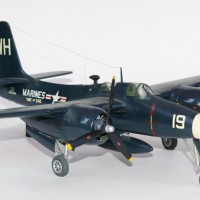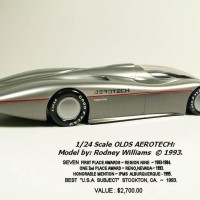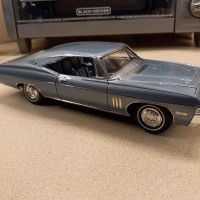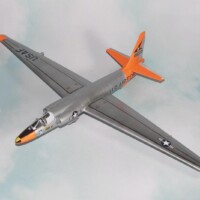Hobbycraft 1/48 Avro CF-105 Arrow
The origins of the Arrow can be traced back In the post-Second World War period, when Canada, like many other western countries, seeked their long range interceptor to counteract the Soviet long range nuclear bomber threat. Upon realizing that the delays in developing of the CF-100 Canuck (which was Avro Canada's first attempt to fulfill the above requirement) might consequently affect its envisaged supersonic successor, the RCAF wasted no time and submitted a requirements report to Avro Canada as early as March 1952, half a year earlier than the Canuck entered service, calling for an advanced, all-weather, supersonic, missile armed long range interceptor.
The aggressive requirements and tight time frame brought intensive discussions between Avro and the RCAF, finally resulting in Specification AIR 7-3 which called for a twin-engine, two-crew supersonic aircraft with a range of 300 and 200 nm for low and high speed missions respectively, attaining a Mach 1.5 cruising speed at 70,000 ft and sustaining 2g turns with no loss of speed or altitude at Mach 1.5 and 50,000 ft.
To meet the strict time frame set by the RCAF, Avro took a high-risk approach by skipping the traditional hand-built prototype phase and building the plane directly from the production line. This risk was further augmented by the fact that leading edge (and, to a degree, unproven) technology would vastly be utilized at all basic aspects of the design.
The big plane would feature a shoulder mounted delta wing, with a basic fly-by-wire system employed to assist the pilot tackling the charismatic but idiosyncratic delta wing. Power would be supplied by two Orenda Iroquois engines, which were then in development stage.
RL-201, the first Arrow (Mk.1), was rolled out to the public on 4 October 1957, which was the same day Sputnik I was launched. The plane started flight tests on 25 March 1958 and the fact that the radical design quickly demonstrated excellent handling and overall performance, reaching, among others, Mach 1.9 in level flight with surprisingly few and not difficult to tackle bugs, can be credited to Avro engineers.
Another four Mk.1s were completed, RL-202, RL-203, RL-204 and RL-205. When the lighter and more powerful Orenda Iroquois engine became available, RL-206, the first Iroquois powered Arrow (Mk.2), was by early 1959 ready for taxi tests in preparation for flight and acceptance tests by RCAF pilots.
All the same, on 20 February 1959, Prime Minister of Canada John Diefenbaker halted the development of both the Arrow and its Iroquois engines, even before the scheduled project review to evaluate the program could be held. Two months later the assembly line, tooling, plans, existing airframes and engines were ordered to be destroyed. This cancellation effectively put Avro out of business, with its highly skilled engineering and production personnel scattered.
The cancellation of the Arrow not only raised considerable political controversy at the time, but also still remains a topic for debate among historians and industry pundits. On the one hand, the plane was supremely designed for its intended purpose and the preproduction machines performed miraculously for such an advanced design. By all means, the Arrow would have been a magnificent aircraft if produced.
As for the conspiracy theories surrounding the immediate destruction of all planes, tools and plans, a more modest approach might lead to a plausible conclusion that it was a move to ensure that the leading edge technology embodied in the Arrow program would not fall into enemy hands. Legend has it that an intact Arrow has been flown and stored “somewhere”.
Hoobycraft surprised the modeling world when it came with a 1/48 Avro Arrow as “early” as in 1987. Though a “modern” tooling and reasonably accurate in external details, the kit suffered from oversimplifications at key areas, such as the cockpit, landing gear, intakes and exhausts. Hobbycraft retooled the kit in 2003, addressing to a degree a number of the above discrepancies.
The specific kit is the initial 1987 release. It was discovered at around 2005 in a small toy shop in Thessaloniki Greek city, together with the company's 1/48 Avro CF-100 Canuck, offered at really low prices (presumably the shop owner did not know that, even by then, those models had become collectors' items. Needless to say I bought them both (and skipped buying the other 1/48 Canuck and 1/72 Arrow that the shop had, a lifetime regret…). Should you wish to read the full build review, you may do so by visiting my beloved site Modelingmadness:
https://modelingmadness.com/review/viet/can/pen105.htm
Happy Modelling!

















Wow, this is a great build Spiros @fiveten! It is also a very attractive looking build. This is something we don't get to see much in 1/48.
Thanks a lot, my friend @v1pro!
Good build of not an easy kit. The older release is a tougher build than the newer one but the newer release isn't much better. All the extras I have are still sitting in the box.
Thanks so much, my friend @dbdlee! Not an easy build indeed.
A friend of mine built this kit a little over a year ago. This is only the second one I've seen. Excellent work on a rare find indeed.
Thank you kindly, my friend @coondog!
That’s awesome, Spiros. It’s an impressive model of an impressive plane.
Thanks a lot, my friend @j-healy!
It looks good, Spiros, it must be quite a sizable model in 1/48 scale.
Thank you very much, my friend @chinesegeorge! Yes, it is quite sizeable, especially lengthwise.
Very cool Spiros. Beautiful finish and decal application.
Thanks a lot, my friend @russjurco!
Great work, Spiros (@fiveten). This is one of those great "might have beens" in history, and also one of those really cool looking airplanes that looks fast just sitting in the chocks. I have never seen one of these built, much less in 1/48. Well done.
Thanks so much, my friend @gblair!
Very impressive all the way around, Spiros@fiveten.
Thanks so much, my friend @eb801!
Looks great @fiveten. All white finishes are a challenge and you have done a good job with this basic kit.
Thank you very much, my friend @vacrat!
Beautiful model - a great account of the prototype's history as well. It's a spectacular looking machine.
Thank you kindly, my friend @christopher!
Excellent build of this less known aircraft, Spiros @fiveten
Great article, very interesting.
Thanks a lot, my friend @johnb!
nicely done Canuck there!
Thank you very much, my friend @grimreaper!
Beautiful Arrow Spiros !
Thanks a lot, my friend @ramair67!
It's a shame they cancelled that program. Even though it would have been a rather specialized and somewhat limited desing, similar to the EE Lightning. Your build looks great, Spiros @fiveten! I like the weathering, which really adds to the simple scheme.
Thanks so much, my friend @fxrob! Would have been awesome to see the Arrow operational.
Well done, Spiros. This must be a fairly large model.
I've had the pleasure of seeing the last Arrow nose section remains, at the Canada Aviation and Space Museum in Ottawa, Ontario.
If you haven't viewed it, I recommend, the CBC produced series/movie, "The Arrow". It's a good portrayal of the Avro Arrow history.
Thanks so much, my friend @gwskat! I will have a look!
Why is the paint yellowed? Nice work
Thanks my friend @johnaitken!
Praise my aged Humbrol white that has become "ivory" for the yellowing
Got it..The Avro movie/docudrame is excellent..but being Canadian am biased..
Pity this wonderful machine did not become operational, my friend @johnaitken. What an imposing sight would have been...
An awesome looking model ! Nice work Spiros @fiveten . Interesting write up about the history of the aircraft and model .
Thanks a lot, my friend @ssgt!
Great article and a great model, Spiros @fiveten! What might've been, eh?
What might've been, eh?
This is just fantastic work, my friend!
Thank you so much, my friend @garybrantley!
It’s a pity this aircraft never made it to production.
It doe remind me of the RA-5C Vigilante a bit, at least the profile that is.
You did a wonderful job on this rare kit and also thanks for sharing the interesting story.
Thanks so much, my friend @alfred!
I really like the look of this aircraft Spiros ,I've never seen this kit , you got a really nice finish it looks great.
Thank you kindly, my friend @neil-foster!
Great build and history lesson of what might have been a great success.
Thanks so much, my friend @chasbunch!
4 hour miniseries is on YouTube w Dan Ackroyd playing Crawford Gordon…
It was produced for the Canadian TV network CBC and, to my knowledge, never show in the US. I picked up a DVD with a 2001 copyright some years ago. Didn't know it was now available on You Tube.
Sounds very interesting, my friend @johnaitken!
Great build, Spiros! I built this kit from it's original release. It's been one of my favorite aircraft. I always amazed me that the Arrow would have given the SR-71/YF-12 a run for it's money, having been built, flown and cancelled before the Blackbird ever flew.
I started a "what if" Mark II of the Arrow some years ago, using the newer kit release and parts from an F-105, but never completed it. Maybe I'll take another look at that.
Thanks a lot my friend @charleshorner! Indeed, the Arrow would have been a miraculous performer operationally.
Your what if concept sounds great. Eagerly waiting to see it accomplished!
Spiros Pendedekas (@fiveten)
This is an amazing model ! QC1 and QC2 have been doing their job with quality control. The photos are nice, and I especially enjoyed reading the article you posted. I learned a lot from reading it.
Not too long ago I have seen several television documentaries about this plane, and some have stated the project was scrapped because the Russians had infiltrated and were working in the factory, and how they were stealing the secrets of it. I don't know how true this is or not, but it could be plausible for how things were going during this era.
It is a shame because this aircraft had unbelievable potential. I'll bet this is a big model ! I'm sure it takes up some considerable storage space.
You have done a magnificent job my friend. This is also the first ever time I have seen one of these built, and it's in 1/48 ! Kudos to Hobbycraft for making this one. I have never seen a kit like this for sale before either. Good thing you grabbed yours when you had the chance to.
I have clicked on several of the various "like" buttons.
Take care my friend.
Thanks so much for all kind words, my friend @lgardner!
Stunning, Spiros. Rare bird! Love the finish!
Thanks so much, my friend @yellow10!
Excellent build!
Thank you kindly, my friend @gkittinger!
Impressive building, looks beautiful. I have never seen this type built on this scale. Good job.
Thank you kindly, my friend @milantesar!
Gorgeous, always loved this plane and saddened at its fate.
Thank you elso much, my friend @butchbryan!